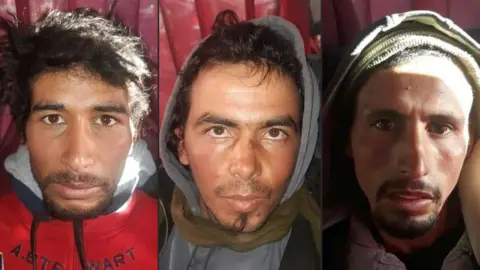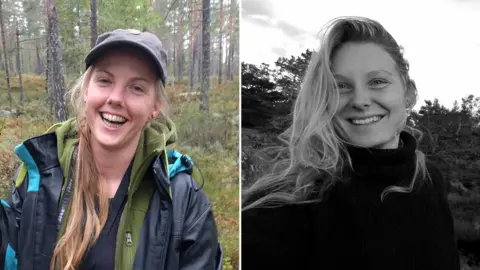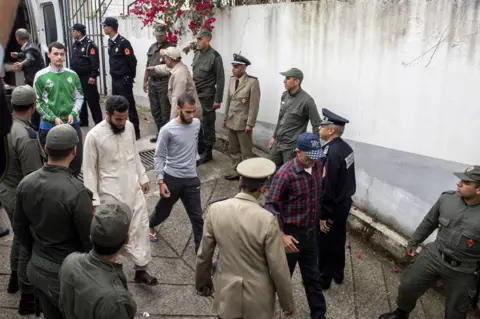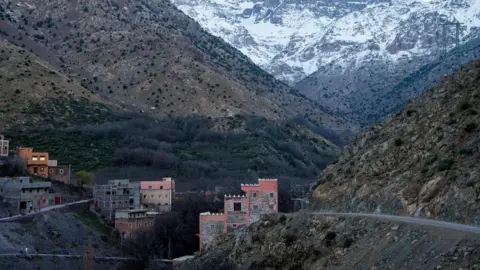Morocco hikers: Three get death penalty for Scandinavian tourist murders
 AFP
AFPThree Islamic State group supporters who murdered two Scandinavian hikers in Morocco have been sentenced to death.
The verdicts for ringleader Abdessamad Ejjoud, Younes Ouaziyad and Rachid Afatti follow petitions on social media calling for their execution.
Louisa Vesterager Jespersen, 24, from Denmark, and Maren Ueland, 28, from Norway, were found beheaded in the High Atlas mountains in December.
If the executions go ahead, they will be the first in Morocco since 1993.
That year saw the country introduce a moratorium on capital punishment.
During the trial, it emerged that Ejjoud, 25, and Ouaziyad, 27, had beheaded the two women while Afatti, 33, filmed the murders on his mobile phone.
 AFP / Facebook
AFP / Facebook"The most just thing would be to give these beasts the death penalty they deserve," Helle Petersen, Ms Jespersen's mother, said in a letter that was read out in court last week.
What happened in court?
The verdict follows an 11-week trial in Salé near the capital Rabat.
Ejjoud, an underground imam, admitted killing one of the two women in May. "I beheaded one of them... I regret it," the street vendor told the court.
French media report that Ejjoud had served a prison sentence in Morocco for trying to join the Islamic State (IS) group in Syria, and was released in 2015.
Afatti filmed the attack on his mobile phone. A video appearing to show one of the women being beheaded was shared online by IS supporters.
Police in Norway said the video was almost certainly real.
 EPA
EPAThe three men all said they were IS supporters, although IS has not said it was behind the killings.
In court, Ejjoud said: "We loved Islamic State and prayed to God for it."
Their defence team said there were "mitigating circumstances on account of their precarious social conditions and psychological disequilibrium", AFP reported.
They said the men had a "very low" level of education and came from modest backgrounds.
Kevin Zoller Guervos, a Spanish-Swiss convert to Islam, was the only non-Moroccan on trial.
He was accused of teaching the main suspects how to use an encrypted messaging service and to use weapons.
He was sentenced to 20 years in prison for "joining a terrorist group", AFP reported.
Read more about the Islamic State group:
Morocco's anti-terror chief, quoted by the AFP news agency, said the group was inspired by IS - but had no contact with IS militants in combat zones.
The prosecution labelled the three killers as "bloodthirsty monsters" after the autopsy report found 23 injuries on Ms Jespersen's decapitated body and seven on that of Ms Ueland.
Who were the victims?
Ms Jespersen and Ms Ueland were flatmates at Norway's Bo University.
Their bodies were found on 17 December in a tent in an isolated area near Mount Toubkal, Morocco's highest peak and a popular destination for hikers.
Both had taken full precautions ahead of their trip, Ms Ueland's mother said last year.
 AFP
AFPThe women were on a Christmas camping trip and were studying to become tour guides.
The killers took four days to identify the women as targets, the prosecution said, and chose them because other potential victims were with guides, AFP said.
Moroccan authorities were criticised by Ms Vesterager Jespersen's lawyer for failing to monitor the suspects' activities, which could have prevented the women being killed.
The Jespersen family requested 10m dirhams ($1m; £800,000) compensation from the Moroccan government for its "moral responsibility" but this was rejected by the court, AFP reported, but the three men who were convicted were ordered to pay 2m dirhams in compensation.
